News & Announcements
- Details
- Written by Joshua Wachtel
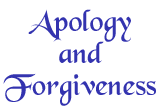 Here's a unique web site created by Lorenn Walker of Hawaii and Ben Furman of Finland. The web site was originally designed to help you create an apology letter. It now has three other features to "Help me imagine a healing dialogue with someone I've hurt," "Help me forgive someone who's hurt me," and "Help me heal and recover from a difficult or traumatic life experience."
Here's a unique web site created by Lorenn Walker of Hawaii and Ben Furman of Finland. The web site was originally designed to help you create an apology letter. It now has three other features to "Help me imagine a healing dialogue with someone I've hurt," "Help me forgive someone who's hurt me," and "Help me heal and recover from a difficult or traumatic life experience."
As the creators of the site explain below, the user is guided through a series of questions – which might as easily be asked by a counselor or therapist – that explore various aspects of empathy, healing and forgiveness. The questions provide an opportunity to reflection and then put the answers together in a way that helps someone see how they might go about apologizing to someone or finding forgiveness.
Watch the video below and try out Apology and Forgiveness web site at http://www.apologyletter.org/
- Details
- Written by Margaret Murray
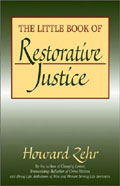 The Little Book of Restorative Justice by Howard ZehrIf you want to read more about restorative practices, there are quite a number of books and articles that do a great job explaining the basic concepts. In fact they’re so good we use them in our courses in our Graduate School. They include the following:
The Little Book of Restorative Justice by Howard ZehrIf you want to read more about restorative practices, there are quite a number of books and articles that do a great job explaining the basic concepts. In fact they’re so good we use them in our courses in our Graduate School. They include the following:
Nils Christie’s brilliant and seminal article, "Conflicts as Property," introduces the amazing idea that individuals involved in a conflict "own" that conflict. Currently this ownership is almost always usurped from them when they enter the legal system. (Restorative justice and restorative practices attempt to return conflict to its rightful owners.)
A second article, "Fair Process: Managing in a Knowledge Economy," from the Harvard Business Review describes how the principles of engagement, explanation, and expectation clarity can be used to produce better outcomes. Even though it’s written for the corporate world, those principles mesh perfectly with restorative practices.
- Details
- Written by Joshua Wachtel
From the radio program, Issues Today with Bob Gourley, during the episode airing the week of October 3 - 9, 2011, IIRP President Ted Wachtel discusses SaferSanerSchools and how restorative practices are being applied in the field of education. Listen to the seven-minute interview here
- Details
- Written by Suzanne Cope
Community Service Foundation (CSF), which operates model programs of the International Institute for Restorative Practices, developed the Restorative Reporting Centers (RRC) in partnership with the Bucks County, Pennsylvania, USA, Department of Juvenile Probation. Instead of sending youth away to residential placement, this community-based program allows them to remain home with their families and in their home schools and immerses them in an intensive environment of restorative practices during evenings and weekends. The model aims to reduce recidivism by holding youth accountable for their behavior and enabling them to make positive changes in their lives, while also addressing the need for community safety. Family engagement is an essential program component. This article includes information on how the program operates and interviews with youth, family members and program developers.
- Details
- Written by Joshua Wachtel
 Ted Wachtel, IIRP PresidentIIRP President Ted Wachtel will be presenting and delivering keynotes at three major conferences in Europe within two weeks during late October and the beginning of November. The general aim of his talks will be to encourage practitioners to associate themselves and connect with the larger international restorative practices movement.
Ted Wachtel, IIRP PresidentIIRP President Ted Wachtel will be presenting and delivering keynotes at three major conferences in Europe within two weeks during late October and the beginning of November. The general aim of his talks will be to encourage practitioners to associate themselves and connect with the larger international restorative practices movement.
In Utrecht, the Netherlands, from October 19 to October 21, 2011, the European congress on the Family Group Conference (FGC, also called Family Group Decision Making or FGDM in North America) will meet on the theme of "Democratizing Help and Welfare" in Europe. The emphasis during the congress is "the important role that may be played by the vision that underlies Family Group Conferencing."
This conference is primarily for FGC/FGDM coordinators and facilitators throughout Europe. Wachtel plans to make the case that welfare and family professionals can begin to see themselves as part of the larger restorative practices movement. This movement includes not only work in the social welfare field, but also restorative conferencing and other programs in the criminal justice field, restorative practices for building positive culture and responding to harm in schools, and community efforts and management strategies in the workplace.
- Details
- Written by Joshua Wachtel
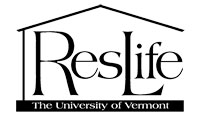 UVM Uses Restorative Practices in Residence Halls Across CampusLast year the University of Vermont (UVM) began using circles and other restorative practices within their department of residential life. In August 2010 IIRP trained all 129 RAs plus other residential life administrative staff to run community circles, to help build community, and also to use restorative practices to respond to incidents in the halls and on campus.
UVM Uses Restorative Practices in Residence Halls Across CampusLast year the University of Vermont (UVM) began using circles and other restorative practices within their department of residential life. In August 2010 IIRP trained all 129 RAs plus other residential life administrative staff to run community circles, to help build community, and also to use restorative practices to respond to incidents in the halls and on campus.
IIRP’s Steve Korr was one of three trainers who delivered this year’s training. “It was a very good training. There was lots of energy, lots of excitement. UVM has a number of very bright people there for whom this really resonated. They very strongly resonated with this whole idea of being real with each other, the whole idea of transparency and having authentic dialog even when it’s not the easy stuff.”
- Details
- Written by Joshua Wachtel
Terry Frieden of CNN reports on Tue October 4, 2011 titled, "Report Calls for Sharply Reducing Juvenile Incarceration":
Locking juvenile offenders behind bars is costly and largely ineffective, according to a report released Tuesday by an advocacy group that favors alternatives to youth detention.
The report by the Annie E. Casey Foundation examined data from the past four decades and found that removing juveniles from detention facilities in cash-strapped states has not caused crime rates to jump.
"Numerous states have closed facilities or lowered correctional populations, reaping significant savings for taxpayers without any measurable increase in youth crime," the report found.
- Details
- Written by Joshua Wachtel
I'd like to point out a new blog of the Colorado Restorative Justice Council, which is being coordinated by IIRP graduate Ben Emery. In a recent post, Emery asks, "Restorative Justice Training - Co-op Style?" He points out:
The State Coordinating Council on Restorative Justice is into its toddler years now. And when Senate Bill 11-1032, deemed the Restorative Justice Bill, landed on 22 district attorney desks this summer, those D.A.s no longer needed to Google restorative justice. Many have been using the approach for some years now.
... Among today's pressing issues facing the Colorado restorative justice community, which include consensus building around standards of practice as well as credentialing, is the question of sustainable training models.
- Details
- Written by Joshua Wachtel
The other day I posted about Dignity in Schools week of action on school pushout. You can find actions near you here.
Since we're based in Bethlehem, Pennsylvania I'd like to highlight this event in Philadelphia tomorrow - Thursday, October 6, 2011, from 5:30 to 8 pm: "Youth Speak Out Against Push Out": Story-gathering on School Push Out, at The United Way Building, 1709 Benjamin Franklin Parkway, Philadelphia, PA (between 17th & 18th).
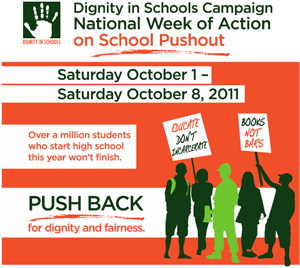
They event page says, "Young people will come together to share their experiences with pushout, including issues such as school policing, zero tolerance policies, the impact of budget cuts, lack of violence prevention, youth incarceration, and more." Folks are invited to: "Come share your stories, hear from young people, and build youth power to challenge the many ways young people are pushed out of our schools!" It sounds like a great event.
- Details
- Written by Joshua Wachtel
Over the next week Dignity in Schools, with whom IIRP has collaborated in the past, now presents a week of action:
Throughout the week of October 1-8, 2011, thousands of parents, youth, and educators will participate in student-led actions and events in 27 cities to expose the school pushout crisis in our nation and advocate for the human right of every young person to a quality education and to be treated with dignity. The events and actions will include street theater, public forums, rallies, restorative justice trainings, and more.
The Dignity in Schools Campaign’s National Week of Action brings together organizations and individuals from 13 states to call for an end to zero tolerance policies, for the implementation of positive approaches to discipline, like restorative justice practices and positive behavior supports instead of relying solely on suspensions and expulsions, and for the passage of federal legislation that promotes positive school climates.
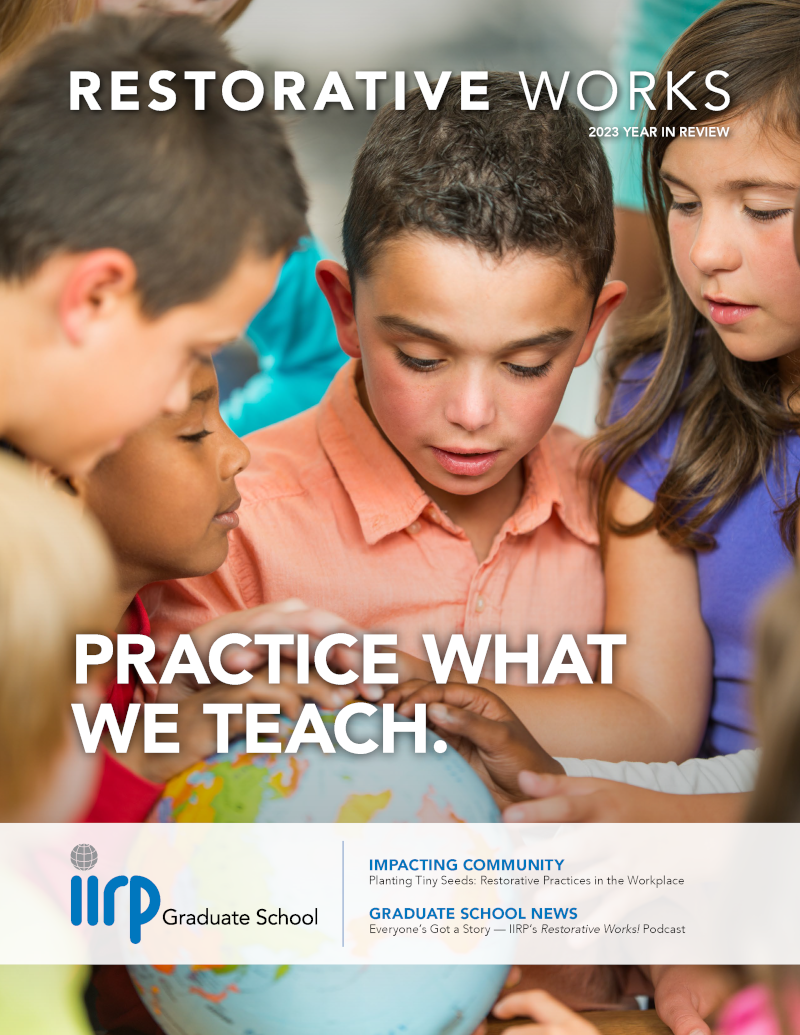
Restorative Works Year in Review 2023 (PDF)
All our donors are acknowledged annually in Restorative Works.

